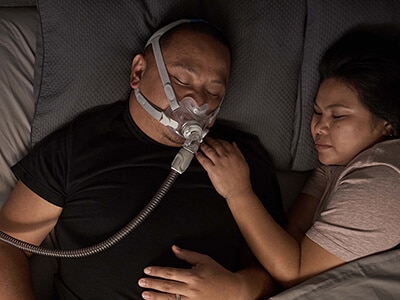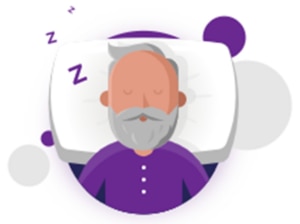Sleep apnoea symptoms and risks

Sleep apnoea is a serious sleep disorder that can increase your risk for developing other chronic and life-threatening conditions.
The good news is that sleep apnoea is treatable. Finding out if you’re at risk is the first step toward improving your health.
What are the signs and symptoms of sleep apnoea?
Obstructive sleep apnoea can affect people in different ways. Maybe your loved ones tell you that you snore loudly or make gasping or choking sounds in your sleep. Or maybe you’re affected by some of the less-known signs and symptoms, such as:
- Fatigue
- Memory problems
- Morning headaches
- Depressed mood
- Excessive daytime sleepiness
- Unrefreshing sleep
- Feeling depressed or low in mood1
- Night sweats2
- Weight gain3
- Sexual dysfunction and/or decreased libido4
- Frequent urination at night5
If any of these sound familiar, why not spend a few minutes taking a simple online sleep assessment? It will tell you if you’re likely to have sleep apnoea and could start you on a journey towards healthier sleep and a better quality of life.
Health risks of untreated sleep apnoea
Clinical studies show that people with untreated sleep apnoea have a higher risk of suffering serious health problems:
High blood pressure
As many as 1 in 3 people with high blood pressure also have sleep apnoea.
43% of people with mild sleep apnoea & 69% of people with severe sleep apnoea have high blood pressure.6
Heart disease
Sleep apnoea may place you at higher risk for heart disease and stroke.
Up to 76% of people with stable heart failure also have sleep apnoea.7
Type 2 diabetes
Nearly 1 in 2 people with Type 2 diabetes also suffer from sleep apnoea.8
Studies show that sleep apnoea may affect the body’s ability to use glucose and insulin.
Hypertension
Sleep apnoea is strongly linked with hypertension, regardless of other risk factors.
83% of people with drug-resistant hypertension also have sleep apnoea.9
Stroke
Multiple studies have shown that people with sleep apnoea are at a higher risk of having a stroke10.
Among people with recent strokes, between 44% and 72% had sleep apnoea.11
Obesity/overweight
The increased energy from treating sleep apnoea may help you have more energy to exercise which can lead to weight loss.
77% of obese people also have sleep apnoea.12
Sleep apnoea increases the risk of motor vehicle accidents
Did you know that people with sleep apnoea are up to 2,5 times more likely than normal sleepers to have traffic accidents?13
A study by the University of Gothenburg found that obstructive sleep apnoea is associated with an increased risk of motor vehicle accidents13,14. However, when sleep apnoea is treated with effective CPAP therapy the risk is reduced.

Who is at risk of sleep apnoea?
Sleep apnoea can affect anyone, including children. If you have obstructive sleep apnoea, you’re definitely not alone.
According to the latest scientific research15, more than 936 million people around the world are affected.
This remarkable figure, which was published in the world’s leading respiratory health journal, is nearly 10 times greater than the World Health Organisation’s 2007 estimate of over 100 million. It is estimated that more than 80% of sufferers are not diagnosed6,16,17 and, as a result, are not receiving potentially life-changing treatment.
There are also a number of significant gender-related differences in the symptoms, diagnosis, consequences and treatment of OSA.
You’re more likely to develop sleep apnoea if you are:
- Overweight or obese, especially if you have a large neck circumference18 of advancing years of age19 A man or a post-menopa usal woman20
- Taking sedatives, such as sleeping tablets or tranquilisers21
- A smoker or you drink alcohol in the evening22,23
- Closely related to people with a history of sleep apnoea24
- Have nasal congestion or certain physical characteristics, like a narrow airway or large tongue25
Get your “What is sleep apnoea?” ebook...
Your free sleep apnoea ebook could help you to:
- Identify sleep apnoea symptoms
- Learn about sleep apnoea diagnosis
- Understand different sleep apnoea treatment options
Complete the form and we’ll send you a copy.
Keep exploring

Starting CPAP therapy
If you’ve recently been diagnosed, you might have some questions or concerns or just want some friendly advice. We’re here to help you get your CPAP therapy off to a successful, comfortable start.

Do you have sleep apnoea?
Are your sleep problems caused by untreated sleep apnoea? Take a few minutes to complete our free online assessment.

Real people. Real CPAP stories
Watch real patients talk about their experiences of sleep apnoea therapy.
References:
- Osman, Amal M., et al. Obstructive Sleep Apnea: Current Perspectives. Nature and Science of Sleep, 2018. 10: 21–34.
- Arnardottir Erna. S, et al. Nocturnal sweating—a common symptom of obstructive sleep apnoea: the Icelandic sleep apnoea cohort. BMJ Open, 2013.
- Lyytikainen P, et al. Sleep problems and major weight gain: a follow-up study. International Journal of Obesity, 2011. 35,109–114.
- Cho, Wook J., and Jeanne F. Duffy. Sleep, Sleep Disorders, and Sexual Dysfunction. World J Mens Health, 37(3): 261–275.
- [1] Ben Mansour, Amani, et al. Prevalence of nocturia in obstructive sleep apnea syndrome. European Respiratory Journal, 2015 46.
- Young T et al. Sleep Disordered Breathing and Mortality: Eighteen-Year Follow-up of the Wisconsin Sleep Cohort. Sleep (2008): 1071-1078.
- Oldenburg O et al. Sleep-disordered breathing in patients with symptomatic heart failure: a contemporary study of prevalence in and characteristics of 700 patients. Eur J Heart Fail (2007):251-7.
- Einhorn D, et al. Prevalence of sleep apnea in a population of adults with type 2 diabetes mellitus. Endocr Pract (2007): 355-62.
- Logan AG et al. High prevalence of unrecognized sleep apnoea in drug-resistant hypertension. J Hypertens (2001):22271-7.
- Bassetti CL et al. Sleep-disordered breathing and acute ischemic stroke: diagnosis, risk factors, treatment, evolution, and long-term clinical outcome. Stroke (2006): 967-72.
- O’Keeffe & Patterson. Evidence supporting routine polysomnography before bariatric surgery. Obes Surg (2004):23-6.
- Karimi M1, Hedner J1, Häbel H2, Nerman O2, Grote L1. Sleep apnea-related risk of motor vehicle accidents is reduced by continuous positive airway pressure: Swedish Traffic Accident Registry data. Sleep. 2015 Mar 1;38(3):341-9. doi: 10.5665/sleep.4486.
- Bonsignore, M.R., et al., European Respiratory Society statement on sleep apnoea, sleepiness and driving risk. Eur Respir J, 2021. 57(2).
- Benjafield et al. Estimation of the global prevalence and burden of obstructive sleep apnoea: a literature-based analysis. Lancet Respiratory Medicine 2019. http://dx.doi.org/10.1016/S2213-2600(19)30198-5.
- Mokhlesi, B. Obesity hypoventilation syndrome: a state-of-the-art review. Respir Care, 2010. 55(10): p. 1347-62; discussion 1363-5.
- Wimms, A., et al. Obstructive Sleep Apnea in Women: Specific Issues and Interventions. Biomed Res Int, 2016. 2016: p. 1764837.
- Webster, L.R., et al. Sleep-disordered breathing and chronic opioid therapy. Pain Med, 2008. 9(4): p. 425-32
- Wetter, D.W. and T.B. Young. The relation between cigarette smoking and sleep disturbance. Prev Med, 1994. 23(3): p. 328-34.
- Scanlan et al. Effect of moderate alcohol upon obstructive sleep apnoea. Eur Respir J. 2000; 16.
- Casale, M., et al. Obstructive sleep apnea syndrome: from phenotype to genetic basis. Curr Genomics, 2009. 10(2): p. 119-26.
- Deacon, N.L., et al., Treatment of Obstructive Sleep Apnea. Prospects for Personalized Combined Modality Therapy. Ann Am Thorac Soc, 2016. 13(1): p. 101-8.
- Wetter, D.W. and T.B. Young. The relation between cigarette smoking and sleep disturbance. Prev Med, 1994. 23(3): p. 328-34.
- Scanlan et al. Effect of moderate alcohol upon obstructive sleep apnoea. Eur Respir J. 2000; 16.
- Casale, M., et al. Obstructive sleep apnea syndrome: from phenotype to genetic basis. Curr Genomics, 2009. 10(2): p. 119-26.
- Deacon, N.L., et al., Treatment of Obstructive Sleep Apnea. Prospects for Personalized Combined Modality Therapy. Ann Am Thorac Soc, 2016. 13(1): p. 101-8.
